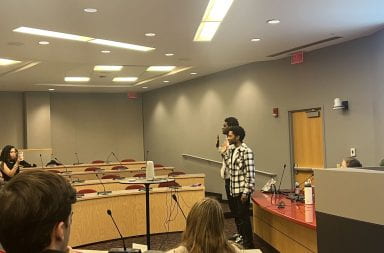In the past week, there has been a lot of attention on education.
A new book, “Academically Adrift: Limited Learning on College Campuses,” explains the findings of a recent standardized test administered on 24 college campuses. The test was given to 2,300 students in their first semester and then again at the end of their second year.
It indicated that, despite many college students receiving good grades, most lack critical thinking, complex reasoning and writing skills. The book also says that 45 percent of students do not show significant signs of learning in their first two years.
Granted, the study wasn’t exactly fair. It did not include subjects in which college students traditionally excel, such as binge drinking, videogames or Facebook. Had these areas been accounted for, I have no doubt the numbers would have been more favorable.
But apparently, colleges are not the only schools at which learning is at a minimum. Another study released last week said much the same thing about elementary and high schools throughout the country, mostly noting deficiencies in math and science.
All is not lost, however. Yet another story said two second-graders in Oakland, Calif., were smart enough to engage in oral sex in front of their teacher and classmates.
Not to be outdone, a math professor at California State University, Northridge, was charged with urinating on a colleague’s office door.
So it makes sense why President Barack Obama made education a major focus of his State of the Union Address. He mentioned the importance of “investing in education,” and ensuring that all Americans have the opportunity to attain higher education.
These pleas appear noble on their surface, but I’m not sure that either one is really in touch with reality.
The United States already invests a lot of money on the development of young minds. According to The Department of Education, the U.S. in 2006 spent $10,267 per student in K-12 and $25,109 per student in college. Both numbers have been increasing steadily since the 1970s.
So it appears that spending exorbitant amounts of money on education has produced students who can’t read, write, count or spell. In the same week that two studies confirmed that spending has not translated into smarter students, the president seemed to call for more spending on education.
The same can be said about ensuring that all students have access to college. More students than ever before attend college. A common complaint about our ineffective public high schools is overcrowded classrooms. Could this also be true for places of higher learning? Are perhaps too many people attending college?
I am not one to believe something just because it appeared in a study or is a popular talking point. Nor am I solely blaming the schools. Students also play a major role in their own demise. But countless studies have been published throughout the years that have yielded similar results.
It seems pouring large sums of money into a faulty educational system that produces underachieving students is like paying money at a gas pump and then driving off without filling the tank.


